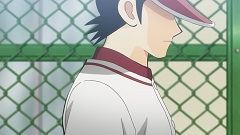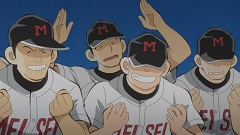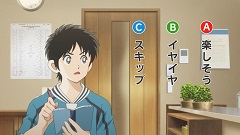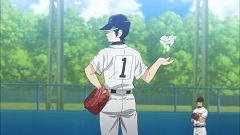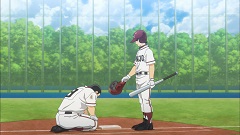Mix is, by my count, the eighth Mitsuru Adachi work to be adapted to animation. I’ve only seen one of the other seven, so it may not be my place to say this, but Mix probably ranks around the middle of those eight. Its main cast is complex, but the non-baseball players among them slip from the series’ focus near the end. Its visual presentation is drab, only springing to life during isolated scenes. Depending on which source you use to watch the show, you may experience a crippling audio issue that buries the dialogue beneath a string-heavy soundtrack (I recommend Commie’s version, which fixed this problem). And yet, for all its shortcomings, Mix retains that signature Adachi atmosphere of emotional realism, mixed with an unpredictability on the baseball diamond that keeps things fresh. The characters may not have completed their arcs in this truncated adaptation, but they’re still the lifeblood of the show.
Tag: mix
Mix – 23-24 [It’s Only a Matter of Time/Don’t You Think They’re Alike?]
After going into extra innings against Toushuu, Meisei’s tournament life ends in anticlimactic fashion. In Adachi’s world of baseball, luck giveth often, but taketh away at critical moments. Touma’s arm failing was bound to happen – Coach Goro predicted it from miles away – but the circumstance of it was a heartbreaker. Meisei was fortunate to have advanced so far in the tournament, relying largely on the talents of their stepbrother battery and preying upon opponent’s mistakes and injuries. It makes sense that they’d bow out at this stage, but we’re still left wanting more, both on the baseball diamond and off. Conventional wisdom says that anime series are just extravagant advertisements for their source materials, but those “to be continued” endings sting every time.
Continue reading “Mix – 23-24 [It’s Only a Matter of Time/Don’t You Think They’re Alike?]”
Mix – 21-22 [If…/Affection for His Sister]
It is well and truly baseball season on Mix, as one game leads straight into another in this doubleheader. I often refer to multi-episode posts that way, but this is the first to live up to the name. Meisei’s fluke of a win against Kaiou West paves the way for a pitcher’s duel in their destined semifinal match against Toushuu, where Touma exceeds all expectations (especially those of his brother). The series found some time for humor, parental pride, and extra-diamond rivalries during these two weeks, but baseball was the show’s prolonged focus for the first time in a long while. Overall, I’d say it managed the change-up with aplomb.
Continue reading “Mix – 21-22 [If…/Affection for His Sister]”
Mix – 19-20 [Do You Envy Them?/In the Hands of a God]
I said in last week’s post that Mix cares about all its characters, but really, these two episodes made that case most strongly. Just about the only member the show couldn’t find time for here was the owner of the ramen place where Haruka works part time. The opening of episode 19 was so focused on Ryou that I felt he might be the series’ new protagonist, before the pivot to a baseball-heavy episode 20 that gave us some of Koma, Imagawa, and Nango’s finest moments. You probably failed to recognize at least one of those names (I had to look up all three), but Mix didn’t forget them for a second. The main cast wasn’t neglected, either – Touma underwent a surprising development, while Otomi’s place in the background gave us another angle from which to appreciate her candid personality. I couldn’t be more pleased, really.
Continue reading “Mix – 19-20 [Do You Envy Them?/In the Hands of a God]”
Mix – 17-18
We’ve reached the midpoint of the summer season, and while plenty of new shows have started spinning their wheels already, Mix has managed to stay steady. Think of all the sports series that enter tournament mode, and suddenly it’s nonstop matches until the starring team either makes an early exit or wins the whole thing. Now consider Mix’s approach in these two episodes. One of them abbreviates a spectacular no-hitter by focusing on the series’ ensemble cast; the other divorces itself from the summer tournament entirely by dialing in on a middle school romance. This will be uncharted territory for some baseball anime enthusiasts, but even those of us who watch for the character drama could be thrown by these decisions. Mix doesn’t care one whit about expectations, though, having been written by a man with a time-tested formula. Though Adachi’s characters often seem to be mirror images of those from his past works, he clearly cares about all of them, since he’s willing to sacrifice tournament time to shine a light on even minor players in the overall story.
Mix – 16 [Full of Fight]
How distracted does a middle schooler have to be to forget his own birthday? For adults, birthdays can get lost in the shuffle of occupational challenges, financial woes, and/or parenthood, but for kids they’re like a second Christmas. The gifts, the attention, the perceived bump in social standing – how could a fifteen year old boy forget such an event? And yet, that’s exactly what Ryou Akai does, only recalling the date when an admiring girl gives him a present before class. Prior to this episode, I’d have said that only his fractured relationship with his brother could have pushed something so special as a birthday from his mind. But Mix steadfastly refuses to shed additional light on their feud, opting instead to bring a new distraction into his life: a newly-minted crush on Otomi Tachibana.
Mix – 14-15 [We’re Losing/I Wanted to See That Expression]
I’ve got to lead with a gripe: Mix’s new OP is worse than the first. I haven’t got anything against Porno Graffiti as a band, but Akihito Okano’s vocal performance is too deliberate and modern for a show this committed to naturalism. What’s ironic is that Sumika, who provided “Equal” for the first opening, have a much simpler, more nostalgic sound than a band that predates them by nearly 15 years. It’s the string arrangement in “Equal” that I miss most of all, now that it’s been replaced by Porno Graffiti’s wailing guitars. The visuals are entirely centered around baseball now, as well, with cuts to stunned crowd members stinking up the final leg of the OP. The disappearance of Little Glee Monster’s ED is a disappointment, as well, but the downgrade isn’t anywhere near as large as this one. That’s just one man’s opinion about the very beginning and end of the episodes, though – read on to hear about the juicier bits.
Continue reading “Mix – 14-15 [We’re Losing/I Wanted to See That Expression]”
Mix – 12/13 [Aren’t You Taking Him Lightly?/Because We’re Brothers]
I missed last week’s post due to a temporary Hearthstone addiction, so here’s a doubleheader for you. These episodes stepped away from the show’s recent focus on romance and character building, opting to broaden the cast in preparation for the East Tokyo summer tournament. Episode 13 actually covers the opening innings of Meisei’s first game, and I have to acknowledge some disappointment at the return to the baseball diamond. It’s a sweet sort of disappointment, though, as I’d been afraid near the start of the series that sports would be the show’s greatest strength. Knowing that the characters are carrying things can propel me through some of the less impressive baseball scenes, which are plagued by static shots and oppressive lighting. Mix’s visual limitations become even clearer when you realize that it refuses to depict characters running the basepaths, cutting directly to the moments when they’re called out by the base umps. Cross Game wasn’t much of a looker either, if I recall – guess I’ve become more critical since then.
The rest of these two episodes make up for the show’s so-so presentation, though. The Tachibana brothers (or Tachibros, as I’ve taken to calling them in my notes) were in fine form for both installments, particularly Souichiro, who’s becoming one of my favorite characters despite the show’s clear Touma bias. His secret desire to pitch may be temporarily squashed as we enter sports anime mode, but the show’s commitment to the story is clear at this point. Coach Goro directly encourages him to pursue the position in episode 12, but Sou is convinced that his brother wouldn’t lose the ace spot so easily. His previous observation that Touma’s ability was buoyed by his own skill as a catcher speaks to his confidence, but that’s one challenge he’s not ready to face yet. Still, he’ll challenge Touma to rock-paper-scissors to use the bath, then offer him the spot without even looking at the result; he’s not above pushing his brother’s buttons regarding their RPS history. The brothers’ reaction to Haruka’s scouting report in the following episode was also quite entertaining. One couldn’t be bothered to read the hefty document, while the other instantly memorized it and used the opportunity to flirt. I’ll leave it to you to figure out which was which.
“Lightly” was most notable for its focus on Meisei High’s past. We finally got the story of Sou and Otomi’s father, the man who took up the mantle of starting pitcher after the school’s miracle run 30 years ago. Though his career was cut short by injury, I can’t say I felt much for the guy, as I’d rather follow the story developing in the current day. It was nice that Otomi got to talk about her dad with a classmate’s mother for a bit, though, especially in the wake of her regret from two weeks ago. As for the story developing in the here and now, much of it centers on Tomohito Akai, power hitter for Kenjo High and older brother to Ryou (the heartthrob of Otomi’s ninth grade class). Tomohito has a massive chip on his shoulder, shooting down Arisa’s attempt to give flowers to his brother and criticizing him for taking too long to deliver a package to Kenjo’s campus during after school practice. It’s Touma who steps in during his terrible treatment of Arisa, setting up their rivalry both on and off the field, but I’m more interested in Ryou’s side of things here. There’s a scene between him and Otomi where she broaches the subject of their difficult relationship, but his reluctance to respond informs us that there’s a bigger story there. I’m looking forward to learning the details of that story in the coming weeks.
Mix – 11 [Try Pitching]
Good news for all you Mix fans out there: the show is likely to be two cour, as the Wikipedia page for its timeslot doesn’t have a replacement listed until October. That means three more months of baseball, romance, and mystifying Japanese puns before Hero Academia S4 kicks Mix off the air for the fall season. I’m very glad for the extension, as the show has settled nicely into its high school phase, and is dedicating entire episodes to character work before kicking off the baseball season. Fans who got into this series for the home runs and double plays might be disappointed with its simple, conversational style, but I find every scene to be rewarding, both taken on their own and viewed as groundwork for the future.
Take Haruka’s character, for instance. After breaking out of love interest hell last week, we learn plenty more about her in the follow-up: her folks are living apart, she’s still in contact with her mom (who slips in and out of their apartment before Goro comes home), and she feels blessed to have two parents who follow their dreams. The scene where she and her dad discuss the surprise visit is funny, as Haruka repeats her mother’s claim that she could only write comedies while living with Goro. Then there was his attempt at subtly asking whether Mom left any money behind – another in a long series of jokes about his mooching ways. But it wasn’t all laughs, either. The scene also played host to a touching daddy/daughter moment, as Haruka affirms that she’s proud of her single dad for doing what he loves. On top of that, it’s worth noting that she turns away from him and back to preparing dinner before “I feel blessed” passes her lips. Though the music is placid and the mood sincere, you can read that she still struggles with her family situation, which I’d bet my bottom dollar will resurface in the future.
Mix – 10 [Just a Walk]
Love is in the air for seemingly every teenage character in Mix’s growing cast, and with no baseball game to distract them, this episode is entirely dedicated to complicating the show’s relationship chart. Even the cold open is a miniature romantic farce, with minor characters Nishimura and Arisa deluding themselves into viewing a conversation between their rivals as something sinister. Arisa proves far more adept at this deception, especially when you factor in the cluelessness of every male character to make it on screen before the OP. Honestly, I don’t remember the names of all Otomi’s would-be suitors, but when [Touma’s friend] and [Otomi’s classmate] came sliding down the hill and into an already crowded scene, I was kind of apprehensive. Sure, I got a chuckle out of the various characters’ desperation and exhaustion, but this felt like the opener to a lightweight episode – or so I thought. Thankfully, “Just a Walk” ended up being one of Mix’s best episodes yet, and it’s all thanks to Haruka Oyama.
Until this point, Haruka hadn’t done much except fill the role of girl next door, but this episode gave her much more to do than that. It’s not as though this episode changes her proximity to the main characters’ house, or makes her any less attractive to Souichiro and Nan-chan (who’ve been frequenting the ramen place where she works part-time). But it does give her a lot more personality, and reveals her past acquaintance with Touma, who she met at a funeral at age three. Turns out she’s got a killer memory, having recalled their encounter from all those years ago – and she likes how he’s grown up. This sheds new light on her cryptic question to Otomi several episodes ago: “Are you worried?” Haruka was feeling her out even then, probably suspecting their shared crush on Touma, and now she’s making her move. Her method of sending him an invitation he can’t refuse was too cute, to the point that I started laughing when Touma automatically greeted her with the go-ahead phrase “good morning,” and she responded with a salute. Their date poses a problem for the hapless kid, as he understands the significance of Sou’s sudden ramen addiction, but after falling into her trap, what choice does he have?
Instead of getting sappy, Mix maintains its wry sense of humor even as the two go out; Touma’s impatience with their multiple train rides leads him to make several comments about the “walk” they were supposed to take. Said walk is mostly uneventful, but the show threads together Haruka’s admission of recognition with a separate funeral story, which depicts three year old Touma as a cheerful kid who had trouble processing his mom’s passing. This detail launched me back to a related one from early in the episode, where Touma remarked to his stepmother that Sou and Otomi were “depressed and unsociable” when he first met them. Connecting these dots was my favorite part of this week’s Mix, as they indicate that Touma still may not have grieved for his mother’s death. To have held on to the idea that two children mourning the loss of a parent were “unsociable” paints a picture of repression, at least in my view. Suddenly Touma’s isolated outbursts on the baseball field make a bit more sense, as well… I really do love Adachi’s character writing, and episodes like this one are great vehicles for it. Now, if only I knew how many more episodes we could expect before the show takes a hiatus.











